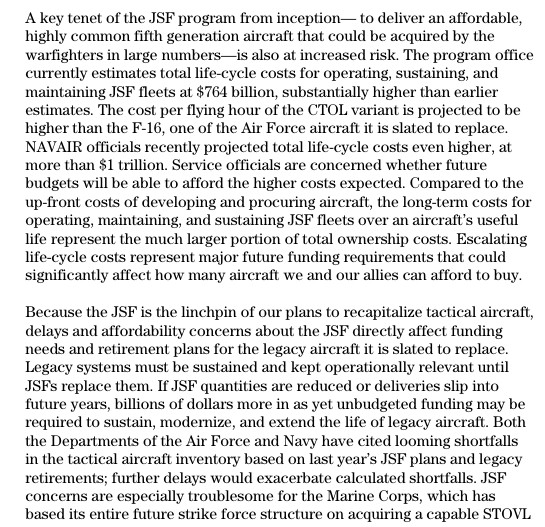There is a fascinating insight into why Defence Minister John Faulkner’s advisors may have been so keen for him to commit $3.2 billion to the JSF project last November contained in this passage in the GAO or Government Accountability Office report into the fiasco published last week.

Get it. Faulkner was conned into promising $3.2 billion upfront for 14 completely useless, undefined, and definitely undeliverable by 2014 initial low rate production F-35s because Lockheed Martin is running a project with the capacity to swallow a very large fraction of US and western allied GDP .
And it isn’t anywhere near to delivering the air power superiority that is promised either, in a world where the changing nature of the threat in our region would make it irrelevant even if it did work as promised.
Flashback to Faulkner’s words, or rather those written for him, about how spending this incredible amount of money on an initial batch of F-35s would enable us to better assess their costs?
Give us a break. Are we getting our money back if they prove too costly? Or are we just shoving cash into the program up front because it badly needs the loot before it gets closed down or substantially slashed?
Back in January when the head of the JSF project was fired for incompetency it was revealed that the jets Australia had signed up for aren’t defined as doing anything. They have no firm capabilities. We’ve bought something that even the US government can’t work out what it will actually do, because it’s capabilities are undefined and unknown. Faulkner has no way of knowing whether the first JSF’s we get will be 1% relevant to the product we want because it will at least have decals in common, or 50% relevant. How dumb is this?
Faulkner must ask himself, who was it who urged this on me, and what did they then know about this program that has only recently been disclosed in a US procurement audit in January and now in the GAO report as being in serious if not terminal difficulties.
Defence has gone deadly quiet about the JSF program and the con-job on the Minister for these initial production units since the GAO report was released last week.
Perhaps the defence bureaucrats who one might reasonably conclude have been masquerading as Lockheed Martin marketing assistants and apologists, have digested it and come to the same conclusion as Bill Sweetman on Aviation Week’s The Ares Blog, who says:
“The good news for the JSF program in the March 20 GAO report – combined with the other numbers released in March – is that the program is no longer at risk of failure.
The bad news is that it has already failed.”
But can someone please explain why voices of dissent on this program like Air Power Australia, or career bureaucrat Erik Peacock, have been so accurate, and the defence establishment almost totally wrong in every single thing they ever said about this project?
Why is failure so ingrained in the defence establishment. Why can’t we get submarines right, why can’t we get helicopters right? Is it because good people get trapped in an administrative culture that tries to call winners too far in advance and then gets enmeshed in group think, where the investment in a solution becomes so large so quickly that contrary voices or changes in technologies or the recogition of changed circumstances have to be suppressed? Is it because foreign policy or trade imperatives have excessive leverage over prudent acquisition? Or do we just engage our money faster than our brains?
Whatever the reason, we face a crushing financial burden to support a failing project, or if Sweetman is right, some very serious writeoffs and fresh investments in an alternative solution, whatever that proves to be.







Crikey is committed to hosting lively discussions. Help us keep the conversation useful, interesting and welcoming. We aim to publish comments quickly in the interest of promoting robust conversation, but we’re a small team and we deploy filters to protect against legal risk. Occasionally your comment may be held up while we review, but we’re working as fast as we can to keep the conversation rolling.
The Crikey comment section is members-only content. Please subscribe to leave a comment.
The Crikey comment section is members-only content. Please login to leave a comment.